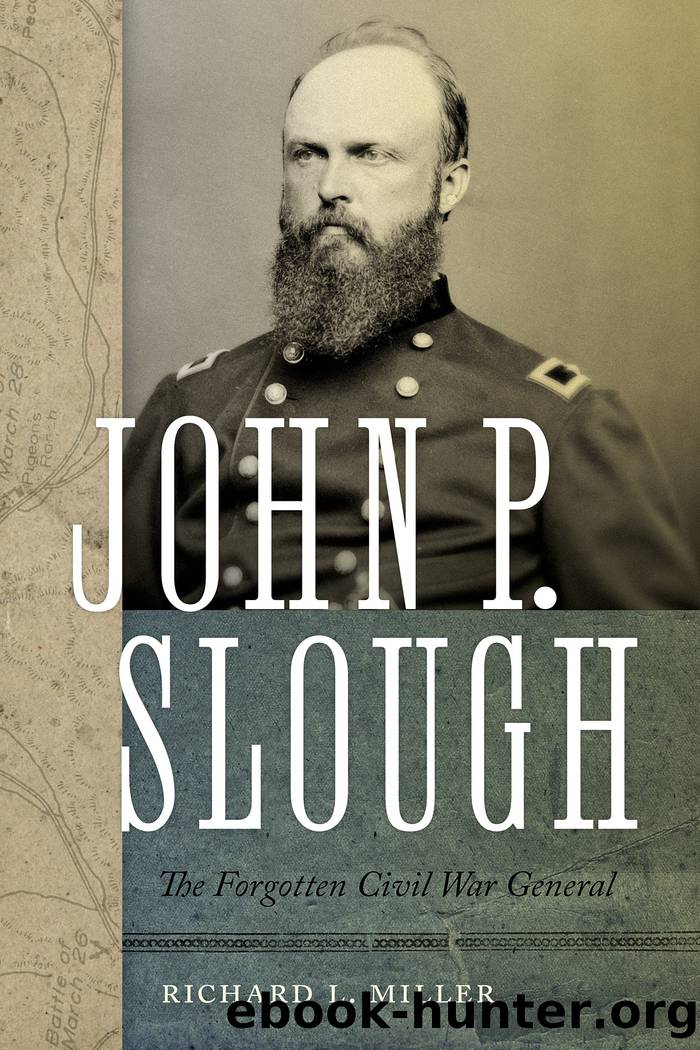John P. Slough by Richard L. Miller

Author:Richard L. Miller [Miller, Richard L.]
Language: eng
Format: epub
Publisher: UNM Press
Published: 2021-04-15T00:00:00+00:00
Julia Wilbur battled Sloughâs administration in Alexandria, Virginia, over its treatment of black refugees. Source: Courtesy of Quaker & Special Collections, Haverford College, Haverford, Pennsylvania, ID mc1158_06_04_001.
She spent her first week in Alexandria visiting impoverished Black people living in the cityâs dilapidated buildings. On November 6, she entered a tenement housing three women and thirteen children, some sick and lying on the damp floor. The building, she wrote, was all âcrevices & ventsâ and offered little shelter to its inhabitants. She then visited the Slave Pen, a structure that in antebellum Alexandria had confined slaves waiting to be sold and now served as a jail for disorderly soldiers and housing for Black refugees. In it she found twenty women and children huddled around a small fire in one room. It was more than she could bear.19
She decided to pressure the authorities to provide adequate shelter for the refugees. Gen. James Wadsworth, the commander of the Department and Defenses of Washington, had warned her about General Slough. A Republican, Wadsworth did not trust the conservative Cincinnati Democrat and told Wilbur that Slough would not support her efforts to assist Alexandriaâs freed people. Wilbur did not waste time appealing to Slough or anyone not sympathetic to her cause. On November 7, the day after her visit to the Slave Pen, she wrote Abraham Lincoln, âin behalf of suffering humanity,â to request that barracks be constructed for seven hundred freed people living in âthe old slave pen & . . . in several tenements that can hardly be called a shelter.â She was not above flattering the president. She told Lincoln that she was âappealing to a kind heart & I come as a child to its father to ask for help in behalf of the most wretched of Godâs creatures.â20
Slough had concerns other than a Northern abolitionist lady begging the president for barracks. Smallpox had erupted in Alexandria. Although the disease sickened white civilians and soldiers, it devastated Alexandriaâs freed people as it rapidly spread through their squalid, unsanitary, and overcrowded neighborhoods. In November, 185 Black people died of smallpox, and by early December, city authorities reported 800 cases and fifteen burials a day. Slough delegated to Provost Marshal Wyman the responsibility of quarantining new cases. Wyman ordered Dr. Charles Culverwell to vaccinate the cityâs Black population and to isolate all persons exhibiting symptoms of smallpox. He also commandeered Clermont, the home of Confederate navy commodore French Forrester, for use as a smallpox hospital. Despite these efforts, Wyman informed Slough on November 29 that smallpox continued to rage among the cityâs Black people. He told Slough that the large number of refugees living in whatever space they could find made the diseaseâs containment impossible. In his opinion, barracks appeared to be the best means for impeding its transmission.21
Slough responded promptly to Wymanâs urgent report. He transferred Dr. J. E. Dow from the armyâs convalescent camp to the provost marshalâs office to aid in the vaccination campaign. He extended the requirement for vaccination to all troops under his command.
Download
This site does not store any files on its server. We only index and link to content provided by other sites. Please contact the content providers to delete copyright contents if any and email us, we'll remove relevant links or contents immediately.
Einstein: His Life and Universe by Walter Isaacson(1998)
Finding Freedom: Harry and Meghan and the Making of a Modern Royal Family by Omid Scobie & Carolyn Durand(1378)
Promised Land (9781524763183) by Obama Barack(1338)
Finding Freedom by Omid Scobie(1288)
Compromised by Peter Strzok(1256)
JFK by Fredrik Logevall(1148)
Freedom by Sebastian Junger(852)
The Russia House by John Le Carré(816)
Salford Lads: The Rise and Fall of Paul Massey by Bernard O'Mahoney(759)
The Irish Buddhist by Alicia Turner(750)
Day of the Dead by Mark Roberts(749)
Kremlin Winter by Robert Service(712)
Graveyard (Ed & Lorraine Warren Book 1) by Ed Warren & Lorraine Warren & Robert David Chase(702)
A World Ablaze by Craig Harline(695)
Joe Biden: American Dreamer by Evan Osnos(668)
Flying Tiger by Samson Jack(661)
100 Things Successful Leaders Do by Nigel Cumberland(644)
Melania and Me: The Rise and Fall of My Friendship With the First Lady by Stephanie Winston Wolkoff(635)
The Mission by David W. Brown(625)
